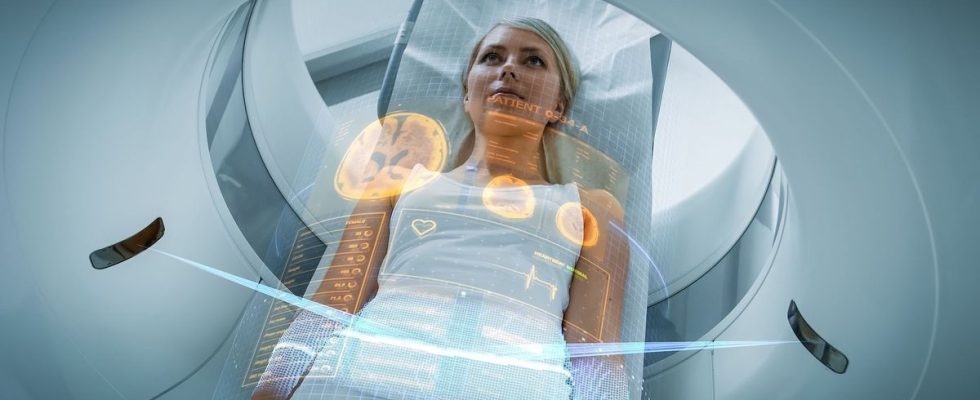Published on
Updated
Reading 4 mins.
An Artificial Intelligence developed by the Institut Curie in France is now able to detect the initial tumor in so-called unknown primary cancers, the origin of which is difficult to locate. With a real chance gain at stake. Dr Sarah Watson, oncologist and researcher at the head of the project, explains this great advance to us.
Artificial intelligence is invading our daily lives, but it is precisely in health that it could prove most useful. Revealed today by The Parisian, an algorithm developed by the Institut Curie could well change the lives of people with unknown primary cancers, that is to say whose origin is unknown. They represent between 2 and 3% of cancer cases (i.e. approximately 7,000 patients per year in France) and are particularly difficult to treat: on the one hand, they are diagnosed at an advanced stage and, on the other hand, for lack of know the origin of the cancer, it is difficult to find the most suitable treatment.
Wilfrid, 51, attacked on several organs, saved by AI?
Wilfrid, on the front page of today’s newspaper, explains his journey against cancer and the salvation offered by AI. Touched by two brain tumors which turn out to be metastases, the man who thinks he is condemned still survives his operation. But new metastases appear in the brain and then in the back. “The fruit was rotten, but we couldn’t find its pit” he testifies. This is the case of so-called primary cancers, a cancer that attacks the body in several places, while hiding its starting point.
In fact, without a real target, chemotherapy treatment works poorly. “The response rate is less than 20% and the effects are very heavy” confirms Dr. Watson, oncologist and researcher at the Institut Curie. On the other hand, from a huge database of 20,000 RNA profiles, the algorithm in question gives an answer to Wilfrid and his doctors and targets 90% of the kidney, an organ that has already been scanned. Targeted chemotherapy is then decided and seems to work.
He is not the only one: 60% of the patients for whom the computer was able to give a diagnosis are still alive ten months later, almost three times the median in these cancers.
Intrigued by this promising technology, we put the question to Dr. Sarah Watson, oncologist and researcher, who is about to present her algorithm at an oncology congress in Orlando (US) this Tuesday.
Dr. Sarah Watson, oncologist and researcher: This AI is based on the automatic analysis of data from the sequencing of all the genes expressed in the different types of cancer (total RNA sequencing, or RNAseq). To put it simply: we trained the machine to teach it to recognize a multitude of different types of cancer based on their “molecular identity card”. We hypothesized that cancers of unknown primary (or CUP), tumors characterized by metastatic spread in the absence of a primary tumor identifiable by standard diagnostic means, retain the identity card of their primary tumour. We first tested the tool on a series of about forty CUPs, and the machine managed to identify the primary tumor in 80% of cases with a high degree of certainty. We have now integrated this tool into the routine diagnostic procedure of CUPs, in addition to the standard clinical, radiological and anatomopathological analyzes which remain essential.
What are the advantages over human analysis?
Dr Sarah Watson: AI is good at analyzing very complex data with a very large amount of parameters. You have to imagine that more than 20,000 genes are expressed in a tumor, and we have compiled data from more than 20,000 different samples to train the machine. This amount of data is an opportunity for AI, which is all the more efficient and precise when it learns on a considerable amount of data. The integration of all these data and their intelligibility are not accessible to the human brain. AI allows us to manipulate this data with precision and render results in an automated, reproducible, and unbiased way. It should however be noted that the AI is only able to learn and recognize what it has been given to learn! It is therefore essential to continue to develop this tool by enriching it with rare tumor profiles, in order to increase its performance..
Can we hope to see this AI develop, become more democratic?
Dr Sarah Watson: Our wish was to distribute this tool as quickly as possible outside the Institut Curie in order to benefit the maximum number of patients concerned. The national multidisciplinary consultation meeting CUP is a national RCP coordinated at the Institut Curie and integrated into the framework of the France Medicine Genomics 2025 plan, which allows all patients with CUP to have their tumor sequencing subject to the availability of tumor material. Our AI tool is now integrated into the molecular analyzes carried out in this context. Registration for this RCP is open on French territory for all patients treated in all centers. Just send an email to [email protected]. We encourage physicians to register the files of their patients concerned as soon as the diagnosis of CUP is suspected, so that analyzes can quickly benefit patients.
The tool will be honored this Tuesday at the major oncology congress of the AACR (American Association for Cancer Research), which is being held in Orlando (United States).
